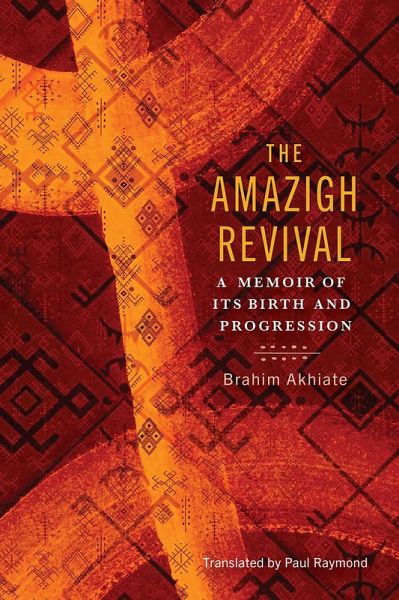
The Amazigh Revival (eBook, ePUB)
A Memoir of Its Birth and Progression
Übersetzer: Raymond, Paul
Erscheint vor. 01.12.25
26,95 €
inkl. MwSt.
Unser Service für Vorbesteller - dein Vorteil ohne Risiko:
Sollten wir den Preis dieses Artikels vor dem Erscheinungsdatum senken, werden wir dir den Artikel bei der Auslieferung automatisch zum günstigeren Preis berechnen.
Weitere Ausgaben:

PAYBACK Punkte
13 °P sammeln!
A memoir of how the Amazigh people successfully fought for their recognition in MoroccoFor decades after Moroccan independence in 1956, the struggle of the Amazigh people for their indigenous rights and cultural preservation took center stage. They fought against their erasure under an exclusivist Arab nationalist regime. Ultimately, they were successful, yet the history of the Amazigh Cultural Movement and its profound impact on North African society have remained largely inaccessible to English speakers, leaving a gap in our understanding of postcolonial resistance, indigenous rights, and cu...
A memoir of how the Amazigh people successfully fought for their recognition in Morocco
For decades after Moroccan independence in 1956, the struggle of the Amazigh people for their indigenous rights and cultural preservation took center stage. They fought against their erasure under an exclusivist Arab nationalist regime. Ultimately, they were successful, yet the history of the Amazigh Cultural Movement and its profound impact on North African society have remained largely inaccessible to English speakers, leaving a gap in our understanding of postcolonial resistance, indigenous rights, and cultural preservation efforts.
The Amazigh Revival is the memoir of Brahim Akhiate, an Amazigh academic, writer, and organizer who was a leader of the Amazigh movement. Translated into English for the first time, it offers unprecedented insight into the Amazighs' fight for recognition and a place in Moroccan society through the first-hand account of a key figure who guided it, starting in the 1960s. Akhiate describes the personal sacrifices, ideological tensions, intellectual debates, and eventual triumphs that led to the constitutional recognition of the Amazigh language and a more inclusive identity.
This memoir, the first work in the Amazigh Studies series, offers English speakers crucial access to previously unavailable perspectives on one of North Africa's most significant cultural movements. Scholars and students across multiple disciplinesincluding the Middle East and North Africa (Tamazgha), postcolonial history, global indigenous studies, Arabic literature, and Amazigh studieswill benefit from Akhiate's detailed recounting of this important political and cultural moment in Moroccan history whose impact has been felt across North Africa.
For decades after Moroccan independence in 1956, the struggle of the Amazigh people for their indigenous rights and cultural preservation took center stage. They fought against their erasure under an exclusivist Arab nationalist regime. Ultimately, they were successful, yet the history of the Amazigh Cultural Movement and its profound impact on North African society have remained largely inaccessible to English speakers, leaving a gap in our understanding of postcolonial resistance, indigenous rights, and cultural preservation efforts.
The Amazigh Revival is the memoir of Brahim Akhiate, an Amazigh academic, writer, and organizer who was a leader of the Amazigh movement. Translated into English for the first time, it offers unprecedented insight into the Amazighs' fight for recognition and a place in Moroccan society through the first-hand account of a key figure who guided it, starting in the 1960s. Akhiate describes the personal sacrifices, ideological tensions, intellectual debates, and eventual triumphs that led to the constitutional recognition of the Amazigh language and a more inclusive identity.
This memoir, the first work in the Amazigh Studies series, offers English speakers crucial access to previously unavailable perspectives on one of North Africa's most significant cultural movements. Scholars and students across multiple disciplinesincluding the Middle East and North Africa (Tamazgha), postcolonial history, global indigenous studies, Arabic literature, and Amazigh studieswill benefit from Akhiate's detailed recounting of this important political and cultural moment in Moroccan history whose impact has been felt across North Africa.
Dieser Download kann aus rechtlichen Gründen nur mit Rechnungsadresse in A, D ausgeliefert werden.













